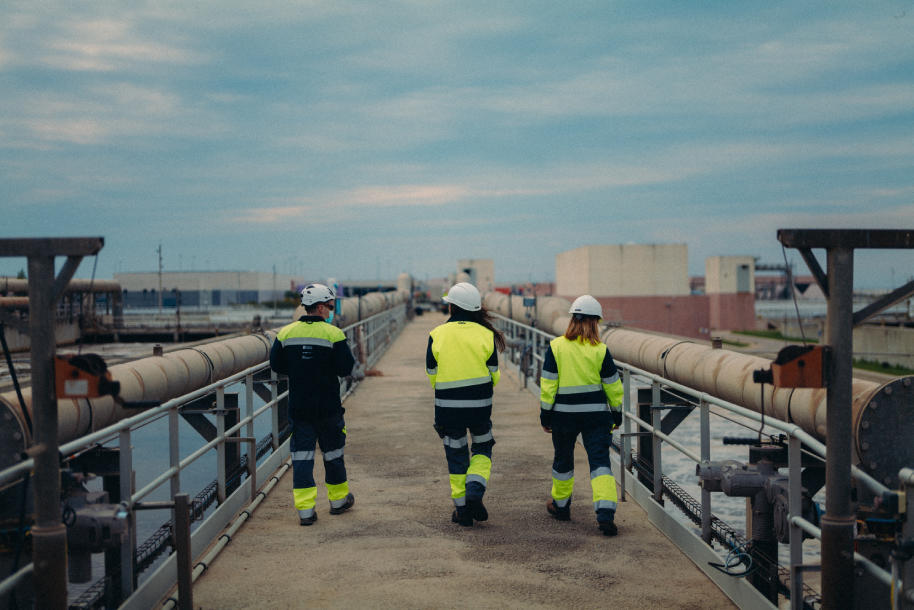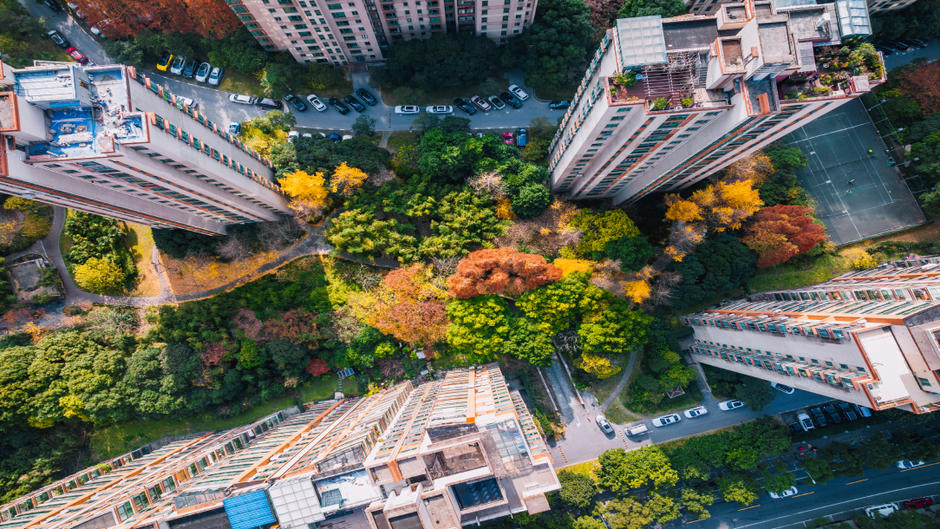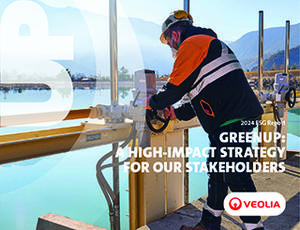Faced with the environmental and climate emergency and the resulting social and human consequences, Veolia is more than ever committed to making a positive impact on the planet.
The Group has set itself the goal of being the reference company for ecological transformation.
To this end, all major challenges related to environmental protection are at the heart of our commitment to environmental performance:
These priority objectives of the Group environmental performance contribute to 6 Sustainable Development Goals of the UN: Clean water and sanitation (ODD 6), Affordable and clean energy (ODD 7), Responsible consumption and production (ODD12), Climate action (ODD 13), Life below water (ODD 14), Life on land (ODD 15).
In its special report on the consequences of global warming of 1.5 °C, adopted in 2018, the IPCC stated: “limiting warming to 1.5 °C is possible within the laws of chemistry and physics, but would require unprecedented transitions in all aspects of society.”
Veolia, as the global champion of ecological transformation, is committed to helping meet the climate challenge by acting to decarbonize our societies and help them adapt to the changes that are already taking place. For 2024, the Group is announcing an ambitious trajectory – the fruit of work done in preparing its 2024-2027 strategic program – to achieve Net Zero by 2050, specifically zero carbon emissions from its activities and the neutralization of its residual emissions.
Our unique expertise and knowhow in water, the main vector by which the consequences of climate change make themselves felt, position us perfectly to help all stakeholders design and implement their adaptation strategies.
WHAT ARE THE GROUP’S ACTION PRIORITIES?
1. Reduce by 50% scopes 1 and 2 emissions in 10 years, and increase by 50% “erased” emissions on scope 4 in particular by:
- Increasing the production and use of low-carbon energies (especially renewable forms) and replace high-emitting fuels with alternative fuels.
- Developing the capture and recovery of biogas from waste.
- Optimizing the energy efficiency of installations in the Group’s various activity sectors.
- Increasing materials recycling, while replacing virgin materials.
- Innovating to decarbonize heat networks & capture, reutilize and recycle biogenic CO2.
2. Deploy adaptation solutions to cope with the extreme, even catastrophic, conditions to which territories are increasingly exposed.
MULTIFACETED PERFORMANCE INDICATORS (ENVIRONMENTAL & COMMERCIAL DIMENSIONS) & 2027 TARGETS
Decarbonization - Scopes 1 and 2 reduction
Indicator
Scopes 1 and 2 GHG emissions reduction
2021 Reference
eq. CO2
2027 target
vs 2021
Decarbonization - Transformation of our assets (including coal exit and methane capture)
Indicator
Decarbonization Capex (including coal exit and methane capture)
2027 target
cumulative for 2024-2027
Decarbonization of our customers - Scope 4
Indicator
Erased GHG emissions
Baseline 2023eq. CO2
target 2027eq. CO2
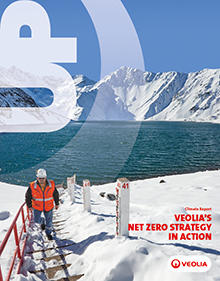
SOLUTIONS
Replacing coal with waste energy recovery
In Lille and Roubaix, France, we operate a “heat super highway.” The heat network has been extended by 20 km to reach the energy recovery plant. Waste is now transformed into heat and electricity. 35,000 homes supplied with heat, and 20,000 homes with electricity.
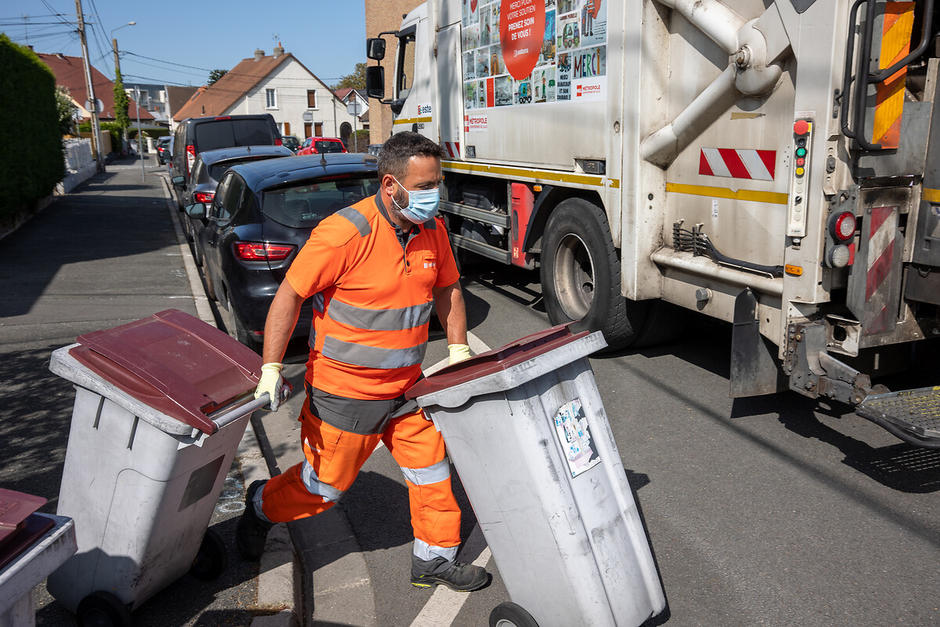
Reuse of treated wastewater to protect freshwater resources
Recycled water can be used for agricultural irrigation (which alone represents 32% of the worldwide market), landscape irrigation, industry, or recharging groundwater tables. In 2022, Veolia facilitated the reuse of nearly 1 billion cubic meters of wastewater, equivalent to the average annual consumption of 18 million people (in developed countries).
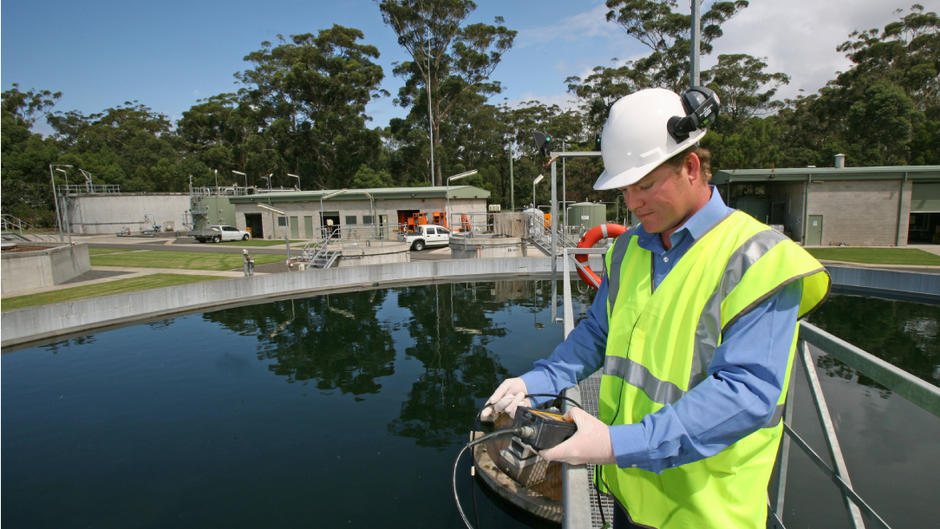
Under the impetus of demographic growth, economic development, industrialization and increasing urbanization, the challenges linked to the management of resources have become multiple and more and more significant.
Veolia is committed to the sustainable management of natural resources by encouraging the circular economy, i.e. the circular economy involves producing goods and services sustainably by minimizing the consumption of raw materials and the generation of waste and pollution as much as possible.
To implement it, a transition economy is needed. Veolia offers concrete solutions:
- Significantly reduce resource consumption of fossil fuels by improving the energy performance of its customers or its own facilities.
- Reuse goods and materials to produce less waste, through the reuse of water or eco-design services for packaging.
- Produce electricity and heat from renewable resources, from non-recyclable waste or biomass.
- Produce renewable energy sources such as biogas, captured in waste recycling and recovery centers or produced by methanization of organic waste and water treatment sludge.
- Sort and recycle waste to replace chemical fertilizers and fossil raw materials.
This is particularly true for water resources which concern:
- access to safe drinking water ;
- overuse of water resources;
- pollution of soil, groundwater and watercourses ;
- destruction of wetlands and the degradation of aquatic environments ;
- resilience of territories to climate hazards
Water is at the center of climatic processes and these issues are now exacerbated by global warming, resulting in an intensification of extreme weather events. Sustainable water resource management is therefore a key line of defense against the consequences of global warming and is at the heart of ecological transformation.
Veolia's proven expertise in the sustainable management of water resources enables it to make ambitious commitments to its customers and to meet the expectations of citizens.
WHAT ARE THE GROUP’S ACTION PRIORITIES?
- Preserve resources through wastewater reuse and water recycling, which help secure access to water in sensitive areas.
- Reduce the water footprint of the Group's customers.
- Promote people's access to essential water and sanitation services.
- Significantly limit the discharge and transfer of pollutants into the water resource.
- Collect, manage and recover solid waste for a healthier environment.
- Recycling of materials, especially plastics.
- Water recycling for new uses.
- Reduction of fossil fuel consumption.
MULTIFACETED PERFORMANCE INDICATOR (ENVIRONMENTAL DIMENSION) & 2027 TARGET
Water savings and resources regeneration
Indicator
Fresh water saved
2023 reference
Mds m3
2027 target
Mds m3
SOLUTIONS
Agua del Sinai: a solution for supplying water to an informal settlement
In Guayaquil, Ecuador, the informal settlement area "Monte Sinaí" (130,000 inhabitants) has the highest poverty rate in the city and is not connected to the drinking water network. The Veolia’s "Agua del Sinaí” solution allows the area to be supplied with good quality drinking water by tanker trucks and reduces the price of water by 25%.
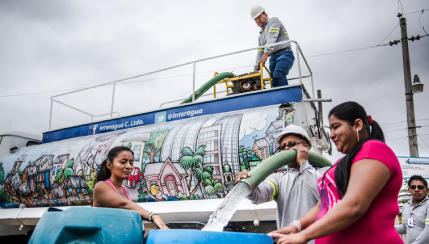
SWARM, an innovative solution for monitoring surface water quality
In order to rapidly detect abnormal variations in surface water quality, Veolia offers the SWARM service enabling the water operator to continuously monitor the evolution of key parameters of surface water quality and condition.
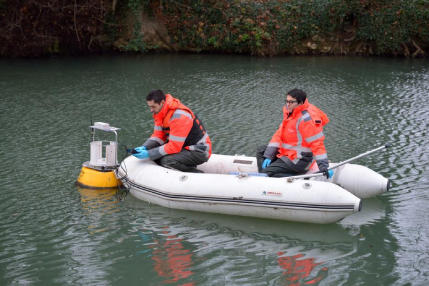
Le ServO, the control center of the largest water utility in France
Veolia Eau has designed ServO, an integrated control center equipped with the latest technologies, for the SEDIF (Syndicat des eaux d'île-de-France) enabling the management and supervision of the largest water service in France: 4.5 million inhabitants served, spread over 150 municipalities in the Île-de-France region.

The global erosion of environments and their biodiversity is unprecedented (IPBES report 2019) and concerns all regions of the world, at the most local scale. This degradation puts at risk our ability to meet our basic needs: healthy food, clean water, raw materials, etc.
According to IPBES (The Intergovernmental Science-Policy Platform on Biodiversity and Ecosystem Services), global biodiversity is experiencing unprecedented decline, mainly due to five major pressure factors:
- changes in land and sea use;
- overexploitation of natural resources;
- climate change;
- pollution;
- invasive exotic species.
While the economic world is partly responsible for the pressures on our ecosystems, the mobilization of its companies is key to inventing the solutions that will enable us to protect, secure and regenerate them. This is the very core of Veolia’s purpose. Veolia’s activities decarbonize, depollute, and regenerate resources. Consequently, they help preserve natural environments (water, air, and soil) and reduce three of the five main causes of biodiversity loss resulting from the activities of the company’s municipal and industrial customers (overuse of natural resources, including water; climate change; and pollution). Veolia offers its clients solutions that reconcile operational performance and planet preservation.
As we renewed our commitments to the collective corporate initiatives Act4nature international and It’s Now for Nature in early 2024, we set ourselves even more demanding targets, in line with international policies established at COP15 and by the CSRD* directive in Europe, particularly in relation to the restoration and protection of ecosystems.
*Corporate Sustainability Reporting Directive
Discover all our commitments under the Act4nature international initiative
WHAT ARE THE GROUP’S ACTION PRIORITIES?
- Deploy action plans to protect and promote biodiversity at sites with high ecological stakes operated by the Group (known as 'sensitive sites').
- Adopt nature preservation and restoration practices everywhere, such as the elimination of phytosanitary products and ecological management across all sites.
- Innovate for our clients by promoting nature-based solutions and developing biomonitoring tools.
- Raise awareness and involve all the Group's stakeholders in its approach to protecting the environment and biodiversity.
MULTIFACETED PERFORMANCE INDICATORS (ENVIRONMENTAL DIMENSION) & 2027 TARGETS
Depollution - Biodiversity
Indicator
Biodiversity preservation on sensitive sites
2023 reference progress rate on action plans to improve the environmental and biodiversity footprint of sensitive sites (perimeter as of 1/1/24)
2027 target
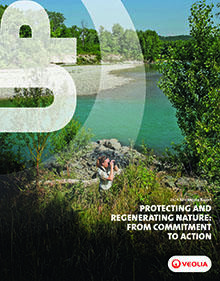
2024 Biodiversity Report
SOLUTIONS
Conduct biodiversity footprints assessments at sites for better preservation and restoration of biodiversity
Veolia has designed, in collaboration with the French IUCN committee and the Ecosphère consulting firm, a tool for measuring a site's 'biodiversity' footprint, which allows for local-scale assessment of negative and positive impacts, both direct and indirect, caused by activities. It has been deployed at more than 150 sites operated by the Group considered to have high biodiversity stakes in terms of the value of present ecosystems, the potential pressure of activities on them, and the levers that can be activated to improve their condition. The footprint measures qualitatively and quantitatively the major issues of a site to then facilitate the development of a semi-automated action plan and monitoring of its progress.

Preserve and restore local biodiversity
In Colombia, the 98-hectare Antanas Environmental Technology Park has retained 3 conservation areas totaling 73 hectares since 2021. The environmental protection non-profit Viva el Planeta is supporting Veolia’s ecological management of the site’s rare tree species, including oaks, palm trees, and Colombian pines, and rare birds such as the acorn woodpecker. The creation of a nursery ensures the availability of endemic species for regreening and reforesting the area. Awareness is also being raised among the site’s employees and local communities by organizing site visits and conferences on biodiversity.

Innovate and Implement Nature-Based Solutions
In Spain, in the Ebro Delta wetland, the largest in Catalonia and an area of high environmental value, the ecological watershed management project aims to improve, through nature-based solutions, the quality of water from rice fields before it drains into the lagoons and bays of the Ebro Delta, and to preserve biodiversity. This 140-hectare wetland is currently home to 48 different water bird species, 33 of which are classified as endangered. It was declared a nature reserve in 2020.

Create biodiversity islands at water service sites
In France, the contract with Société des Eaux de Marseille includes strong commitments to biodiversity. These actions include creating biodiversity islands in urban areas through increased vegetation of sites, annual planting of 670 local plants and melliferous shrubs, contributing to the blue corridor by creating four ponds on reservoirs, preserving the reed bed of the Réaltor basin (second largest ornithological reserve in the department), installing vegetation on wall roofs and/or around reservoirs, setting up 120 beehives.







